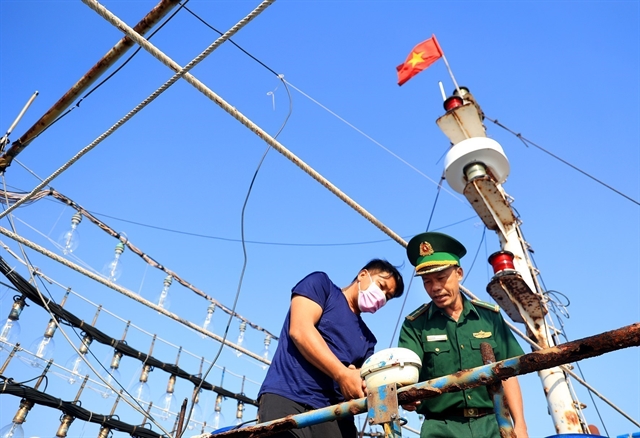 Society
Society


|
| A border guard in the Mekong Delta province of Kiên Giang checks the vessel monitoring system on fishing boats. VNA/VNS Photo |
The overlapping and bordering water areas are abundant in aquatic resources, making them attractive for fishing vessels that engage in illegal activities. Ngô Đặng Hoài, Secretary of the Party Committee of the Fisheries Surveillance Unit No 2, talks to Bà Rịa - Vũng Tàu Newspaper about prevention and combat of illegal, unreported, and unregulated (IUU) fishing in these waters.
Could you please elaborate on the recent deployment of IUU prevention and control measures in the overlapping waters between Việt Nam, Indonesia, and Malaysia?
Following Việt Nam's receipt of a "yellow card" warning from the EC, the Fisheries Surveillance Unit No 2 took decisive action by deploying numerous ships to conduct inspections and control operations in the fishing grounds across the southern sea area, which shares borders with Indonesia, Malaysia, and the entire DK1 sea region.
During patrols, our ships meticulously develop plans to monitor, control, and inspect fishing activities on a daily, weekly, or irregular basis, particularly in response to information regarding fishing boats and fishermen operating in the area.
Whenever we identify fishing vessels exploiting resources in our sovereign waters, beyond the demarcation line or within the prescribed distance of the lower edge of the overlapping area, our fishery surveillance vessels follow a systematic approach, starting from observation and tracking, followed by outreach and communication efforts. We aim to prevent and, if necessary, escalate our response by organising a siege, making arrests, issuing administrative sanctions, transferring the offenders to shore, and handing them over to local authorities for further action.
As a result of these efforts, between 2017 and now, we have recorded a total of 228 fishing vessels involved in various violations. We have proposed sanctions against 84 vessels and temporarily detained eight Vietnamese boats that violated the law while fishing at sea. The most common violations committed by fishing vessels include the absence of fishing logs, fishing in unauthorised waters not specified on their licences, lack of cruise monitoring devices, and fishing without proper licences.
Thanks to the synchronisation of our actions and measures, we have observed a notable decrease in the number of Vietnamese fishing boats being detained by foreign authorities.
Could you explain the situation of Vietnamese fishing vessels in the seas bordering and overlapping with Indonesia and Malaysia?
The majority of fishing boats in this region comply with the regulations and laws governing fisheries. However, there are still some vessels that do not strictly adhere to these rules. These non-compliant practices include fishing in unauthorised areas and routes, failing to possess the required documents, and neglecting maritime safety conditions. Moreover, some fishermen engage in unrestricted and spontaneous exploitation, resorting to destructive fishing methods such as using explosives or electric pulses.
Furthermore, a portion of fishermen employ tactics to violate foreign waters for illegal fishing activities. These fishing vessels frequently gather in groups of five to ten ships operating in border areas. They remove the AIS cruise monitoring system from one ship and install it on another vessel operating within our country's territorial sea, allowing the remaining ships to exploit foreign seas undetected under the cover of night.
In addition, some violating fishing vessels resort to tactics such as painting fake number plates, operating without being registered or managed in the appropriate locality, or disembarking in different locations, making it challenging to verify their information. These fishing boats are often old, and when caught, the ship owners are willing to abandon them to avoid penalties.
To remove the "yellow card" for Việt Nam's seafood industry, what key solutions will the Fisheries Surveillance Unit No 2 prioritise?
In October 2023, the EC's inspection team will conduct its fourth visit to Việt Nam to assess our progress in combating IUU fishing. Meanwhile, Indonesia and Malaysia are intensifying their efforts in patrols, control measures, and the apprehension of foreign fishing vessels that violate their waters. They treat illegal fishing as a serious offence akin to piracy and respond with strict penalties, including boat destruction, fines, imprisonment, and, if necessary, the use of firearms to suppress offenders.
Recognising the gravity of the situation, the Fisheries Surveillance Unit No 2 will adopt a comprehensive approach that integrates fisheries management and IUU prevention and control measures.
Specifically, our division will actively collaborate with the coast guard, and local authorities to conduct inspections and share information regarding the methods employed by Vietnamese fishermen who engage in illegal fishing activities in foreign waters.
We will concentrate our efforts in areas such as Bà Rịa - Vũng Tàu, Kiên Giang, and Cà Mau, in accordance with Directive No 17 issued on June 24, 2021 by the Prime Minister, as well as the prescribed procedures for penalising violating fishing vessels.
During maritime operations, our ships will closely cooperate with law enforcement agencies to obtain accurate data on the number of fishing boats being utilised by our fishermen in the seas, particularly in bordering areas. We will ensure the proper declaration and transmission of this information through fisheries communication channels and engage in direct outreach to raise awareness among the public. It is crucial for people to acquire a comprehensive understanding of maritime law and encourage fishermen to engage in legal and responsible fishing practices, promoting sustainability in the fishing industry. VNS




